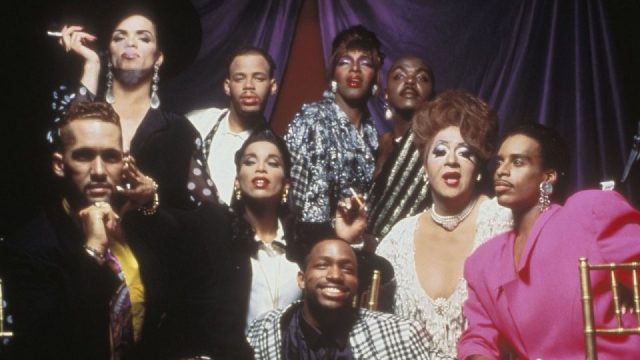Paris Is Burning: Don’t You Know Your Queen?, by David Bax

With a new restoration on behalf of the UCLA Film & Television Archive, Sundance and Outfest, supervised by director Jennie Livingston herself, 1990’s Paris Is Burning returns to theaters just a week behind a similarly crucial restoration of Frank Simon’s The Queen (1968) and just over a month after the most recent season finale of RuPaul’s Drag Race.
At more than a decade old, Drag Race‘s ascension to cultural phenomenon (Shangela was just in a goddamn McDonald’s commercial, y’all) has been a gradual one. But, as evidenced by Paris Is Burning–filmed from 1986 to 1989–the journey has been much longer than that, and with a painfully long way to go. The roots are there at the end of The Queen, when Crystal LaBeija goes off on the organizers of the 1967 Miss All-America Camp Beauty Pageant after yet another white queen walks off with the top prize. We see her being encouraged by a friend to start her own thing and, when Paris Is Burning picks up nearly twenty years later with Crystal’s successor, Pepper LaBeija, the head of a respected team of queens of color, it’s clear that she did just that.
Paris Is Burning is a masterpiece that works as well as it does because its point of view is not that of someone instructing the audience like a tenured professor. White, cisgender, Ivy league educated Livingston does not say, “Look what I’ve discovered.” She invites you to enter this world with her and then puts the queens in charge of telling you about it.
In her role as an organizer of information, though, Livingston takes a lexicographical approach. Chapter headings like “BALL” or “LEGENDARY” double as introductions to the terms of art used in the scene. Some of these have since become commonplace, like “vogueing” or “throwing shade.” Others, like “reading,” meaning an incisive and thorough dressing down, will be familiar to those in the straight world with friends who aren’t. Still others, though, provide insight, at least to an outsider like me, into the values and circumstances of the drag queen community, especially as it existed in New York City 30 years ago. The prevalence of “mopping,” a glorified term for shoplifting, is a clue as to the economic situation in which so many of these queens live. And a sticky term like “realness,” the malleable parameters of which have to do with convincing gender performance, creates a common thread to the present day, where we continue to have difficulty talking about the spectrum of gender and sexual identity amid centuries of imposed binaries.
Looking backwards at The Queen from the perch of Paris Is Burning throws into stark contrast just how different the New York drag scene had become. Simon’s intimate, eye-opening film nonetheless featured a competition that was almost laughably tame and straightforward. Compare the demure, if campy, beauties of the late 1960s scene to those in Livingston’s film and prepare to be dazzled. The microspecific categories in which the queens compete–from military to executive to “banjee realness”–are just one fun-filled development. But the difference that cannot be ignored is race. One veteran of the earlier times sheds light on the situation that necessitated the evolution to which we are witness: “Nobody wanted … Lena Horne. Everybody wanted a black Marilyn Monroe.”
One term that gets plenty of usage in Paris Is Burning is “children.” More or less everyone in the scene and the competitions is described as such. It quickly becomes clear that this is not condescension; rather, with each queen belonging to a devoted team or group called a “house,” they all see themselves as members of a family. It’s no surprise that Pepper LaBeija adopted Crystal’s last name.
With such closeness and intimacy comes deep attachment. The subjects of Paris Is Burning feel it for each other and, by the end, we feel it for them. That makes one late, tragic revelation thoroughly devastating. In this moment, Paris Is Burning serves as a reminder, for the many who could use it, that we are all human beings.




























